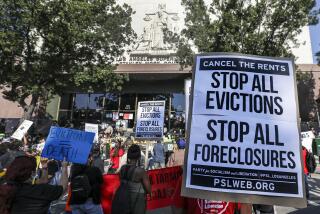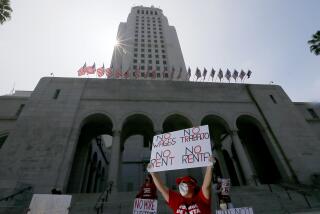Editorial: Housing discrimination isn’t a crime-fighting tool
No one wants a nuisance for a neighbor. No one wants to live next door to people who are noisy, combative or involved in a criminal enterprise, such as peddling drugs or stolen goods. No landlord wants to rent to such folks, either. Cities big and small struggle to find a balance between preventing crime and alienating the residents being policed — between enforcing laws to ensure crime-free housing while also following the laws governing fair housing.
The city of Hesperia in San Bernardino County wrestled with that issue in 2015, but got the balance disturbingly wrong. The city’s Crime Free Rental Housing ordinance, which went into effect at the beginning of this year, seeks to address an increase in “illegal activity and public nuisances” in rental properties there. San Bernardino County Sheriff’s Department officials told City Council members that 90% of the city’s homicides in 2014 were committed in rental units and that 22,000 of 66,000 calls for service that year originated at rental properties.
It’s reasonable that this high desert city — an enclave of affordable housing with a population of about 90,000 — would look for ways to reduce crime. But what officials have concocted is a mandate that steps on the rights of tenants and landlords alike. Expanding on a voluntary program for multi-unit buildings, the ordinance compels participation by all rental property owners and their tenants. Landlords are required to run local and national criminal background checks on prospective tenants, evidently in the hope that they will shun applicants with records. And new tenants must sign a Crime Free Lease Addendum agreeing that they will not violate any federal, state, or local law on the premises of their rental unit. If tenants do violate any of the above, the lease requires that they face eviction within days.
If sheriff’s deputies make an arrest at a unit covered by such a lease, the ordinance requires the Sheriff’s Department to send a notice of criminal activity to the landlord, who must start eviction proceedings against the tenant. The degree of criminal activity doesn’t seem to matter — a raucous party appears to be just as damning as an assault with a deadly weapon. And San Bernardino Sheriff’s Department officials say they consider having to arrest someone on the premises evidence of his or her criminal activity — even if the arrest leads to no formal charges or conviction.
That alone is an appalling overreach by city officials and law enforcement. An arrest is not a finding of guilt. That’s up to a judge. But the problems with the measure do not end there. As the California Apartment Assn., which represents property owners, argued in a letter to the Hesperia city manager, “[K]ey provisions of the ordinance are unconstitutional, inconsistent with state law and subject owners to the risk of significant liability for fair housing violations and wrongful eviction.”
The American Civil Liberties Union has filed suit against the city, contending that the rental housing ordinance as well as the city’s group home ordinance — which forbids two or more probationers from living in the same house — are discriminatory and unconstitutional. The ACLU’s clients include the non-profit Victor Valley Family Resource Center, which rents three properties in Hesperia, and several probationers who live in them. The center offers housing and services to people on probation who were at risk of becoming homeless after their release from incarceration. The ACLU lawyers contend that the city has used both ordinances to pressure landlords to push out probationers simply because the city doesn’t want people with criminal records in the community. Ironically, the nonprofit was hired to house adult probationers in Hesperia by a county government agency — the San Bernardino Probation Department.
Both city ordinances appear headed for court battles, and rightly so. It is unacceptable for a municipality to cope with crime by adopting overly broad rules that invade tenants’ privacy and force landlords to evict tenants for minor infractions or allegations that prove unfounded. Nor should any city adopt what amounts to a blanket discriminatory rule against people who have served jail or prison time for a conviction and now seek to reenter society.
It’s fine for Hesperia to be vigilant about crime in rental properties. But not at the expense of renters’ constitutional rights.
Follow the Opinion section on Twitter @latimesopinion and Facebook
More to Read
A cure for the common opinion
Get thought-provoking perspectives with our weekly newsletter.
You may occasionally receive promotional content from the Los Angeles Times.






